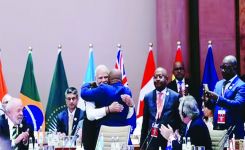- Daniel K. Inouye Asia-Pacific Center for Securi...
- Proportional Analysis of India in G20 with Chin...
Proportional Analysis of India in G20 with China in G77

The Global North comprises developed countries that parallel the Western World and includes Australia, Europe, Israel, Japan, New Zealand, Northern America, and South Korea. When considering the Global South, it refers to a loose coalition of developing nations that share common interests and challenges, mainly in Africa, Asia (excluding Israel, Japan, South Korea), the Caribbean, Latin America, and Oceania (excluding Australia and New Zealand). While India is advocating for 19 countries and two Unions within G20 to enhance North-South Cooperation, China plays a considerable role in the 134-nation G77 plus China, symbolizing China plus South-South Cooperation. Commonalities include global connectivity and a global supply chain for economic transformation and expansion. China, on one hand, and the US and Allies, on the other hand, are attempting to court the Global South, prioritizing Saudi Arabia in both Johannesburg and New Delhi. Enhanced partnership between the Global North and the Global South emerges amid shifts toward ‘de-Westernization’ and ‘de-dollarization’ in GN countries, aiming to accommodate new powers like the Beijing-Moscow-Pyongyang axis. These serve as roadmaps for global powers, emerging powers, and rising powers to shape their own foreign policy visions for their regions and the world. There is apprehension among Non-Aligned Movement nations, including Nepal, to explore modified versions of ‘Non-Alignment’ in international diplomacy.
READ THE FULL ARTICLE


